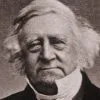There are two reasons for drinking: one is, when you are thirsty, to cure it; the other, when you are not thirsty, to prevent it. The first is obvious, mechanical, and plebeian; the second is most refined, abstract, prospicient, and canonical. I drink by anticipation of thirst that may be. Prevention is better than cure.
Thomas Love Peacock (1785-1866) English novelist, satirist, poet, merchant
Melincourt, ch. 16 (1817)
(Source)
Quotations about:
proactive
Note not all quotations have been tagged, so Search may find additional quotes on this topic.
The time to guard against corruption and tyranny is before they shall have gotten hold of us. It is better to keep the wolf out of the fold than to trust to drawing his teeth and talons after he shall have entered.
Thomas Jefferson (1743-1826) American political philosopher, polymath, statesman, US President (1801-09)
Notes on the State of Virginia, Query 13 (1782)
(Source)
To live bravely by convictions from which the free peoples of the world can take heart, the American people must put their faith in long-range policies — political, economic, and military — programs that will not be heated and cooled with the brightening and waning of tensions. The United States has matured to world leadership; it is time we steered by the stars, not by the lights of each passing ship.
He who does not punish evil commends it to be done.
Leonardo da Vinci (1452-1519) Italian artist, engineer, scientist, polymath
Note-books (1508-1518)
(Source)
In some versions, this is translated as "commands it to be done."
Every evil in the bud is easily crushed: as it grows older, it becomes stronger.
[Omne malum nascens facile opprimitur; inveteratum fit pleurumque robustius.]
Marcus Tullius Cicero (106-43 BC) Roman orator, statesman, philosopher
Philippicae [Philippics], No. 5, ch. 11 / sec. 28 (5.28) (1 Jan AD 43)
(Source)
(Source (Latin)). Alternate translations:Every evil is easily crushed at its birth; when it has become of long standing, it usually gets stronger.
[tr. Yonge (1903)]Every evil is easily crushed at its birth; become inveterate it as a rule gathers strength.
[tr. Ker (1926)]






